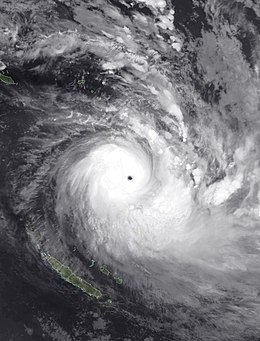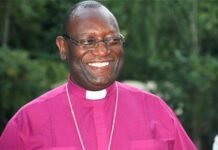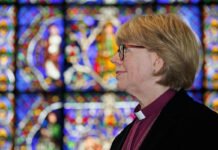The Bishop of Central Vanuatu and New Caledonia reports the island of Espiritu Santo has been devastated by Cyclone Harold, with up to 90 percent of the homes in the principal town of Luanville left in ruins and the island stripped of vegetation.
Tropical Cyclone Harold formed on 1 April 2020 over Eastern Papua New Guinea before moving southeast and strengthening as it passed over the Solomon Islands, Vanuatu, Fiji and Tonga, finally dissipating on 11 April 2020. It reached category 5 intensity on 5 April and made landfall on Espiritu Santo the next day. Harold was the first Category 5 severe tropical cyclone to occur in the South Pacific basin since Cyclone Gita in 2018 and was also the second-strongest tropical cyclone to ever affect Vanuatu, behind Cyclone Pam in 2015 and is the most intense tropical cyclone thus far worldwide in 2020.
In a Good Friday letter to his diocese, the Rt. Rev James Tama reported the devastation was horrific. “I come to you today with both a heavy heart and open hands.”
“Tropical Cyclone Harold has wreaked havoc upon our communities in Santo with over 500 households completely destroyed and others in dire need of repairs and renovation. Our villages have been left without water, communication and food shortages are expected in the coming weeks. Over 5000 people are homeless.”
“Our Anglican Church of Melanesia and Diocese of Vanuatu and New Caledonia has activated its Emergency Operations Centre to respond to the growing needs of individual parishioners, parishes and communities within which we live and serve. The need for spiritual fortitude and faith could not be more tested and I appeal to you, our good fellow brothers and sisters, our partners and our members of the church to communicate with our Emergency Operations Centre based at the ACOM office in Luganville to provide any assistance to this response period and the recovery phases.”
“Our Parish working parties have started clearing the debris throughout each parish. Our clergy are deploying as members of the Health Cluster Emergency Medical Team to provide COVID-19 awareness and spiritual encouragement to affected communities and people living with disability.”
The bishop added he had moved Easter celebrations in the diocese back by one week “to allow for families to take stock of the damage to their homes and properties and settle into the long road to recovery. We are in a State of Emergency.”
Bishop Tama observed, however: “The trees and gardens may be destroyed, but our spirit remains intact. Our homes and families may be struggling but our faith and our Church remain standing. We are united as a church and a people. We have seen this magnitude of devastation before and we have recovered. We will do it again.”
He appealed to the diocese Anglican partners and the “ Anglican community at large to assist us in this time of great need. So that we may rebuild, we may build back our communities and we may resume the mission of the church.”



